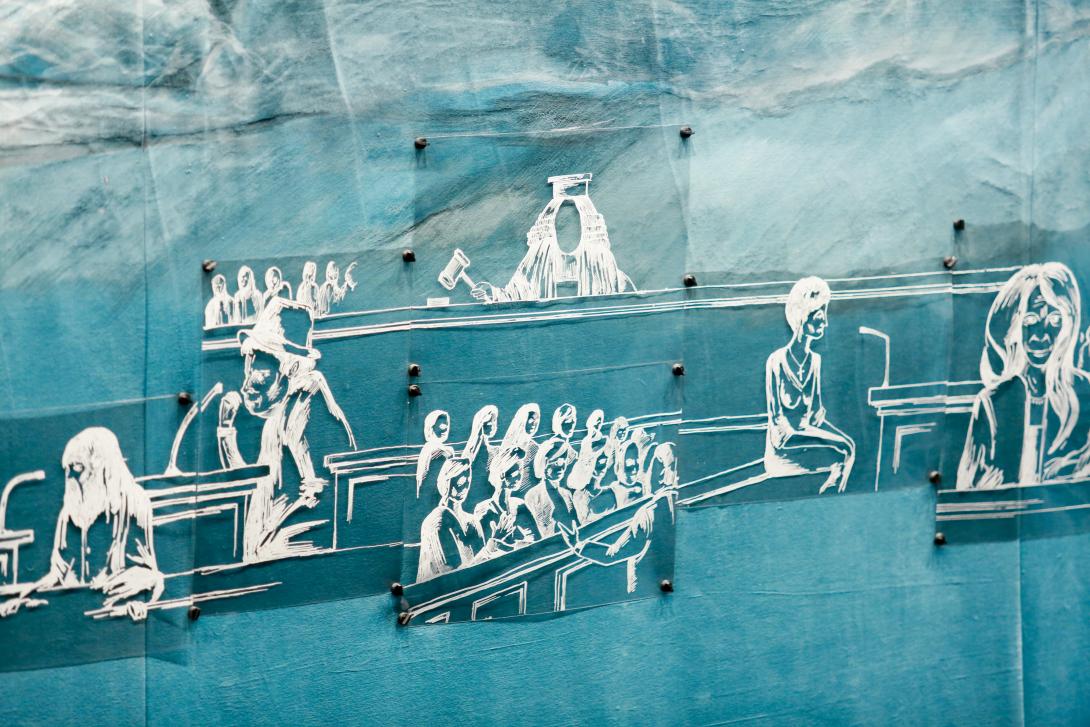Welcome to the Tribunal for Semi-Human Persons!
an interview with Christophe Meierhans
For theatre maker Christophe Meierhans, the theatre is the ideal place to conduct community experiments, because people gather with the explicit intention to give credit to things which they wouldn’t per se take seriously otherwise. In Some Use for Your Broken Claypots, he lead an audience into discussing the basis for a new constitution, in A Hundred Wars to World Peace the public found itself engaged in an anarchist collective cooking process. Now, with Trials of Money, the theatre audience becomes the members of a court of justice prosecuting a thing: money. By questioning witnesses, the spectators are put before the grave responsibility of deciding whether money is guilty or not. Welcome to the Tribunal for Semi-Human Persons!
In Trials of Money, you take money to court. What are you accusing it of?
In the trial, money is accused of secretly shaping our worldviews. There is this idea that humans have always exchanged and that money has only appeared as a facilitator of this “natural” tendency, as a purely logic evolution. But that is historically wrong. You could rather say that it is the existence of money that made exchange the prime modality of humans’ economic interactions. Primitive forms of money were given a mostly symbolic function: it stood for a price that couldn’t possibly be quantified, such as the dowry in marriages, or as a symbolic compensation when someone died. At one point though, probably with the emergence of larger empires, this symbolic currency started to be used as a means to actually measure the value of goods. Looking back, money is mostly seen as something that just responded to existing needs, but it was in fact itself very instrumental in generating these needs.
The form of money we use today is a very specific kind of money with a very specific mode of functioning, even though we often just refer to it generically as ‘money’. It embeds specific values at the very core of its technical design which aren’t innocent pragmatic technicalities. In some respect you could refer to money as being a kind of source-code of the economy. In this view, anything that is running on top of this source code (markets, trade regulations, etc.) must be somehow conditioned by money’s own embedded logic. So when you use a form of money that is designed around debt and scarcity it is very likely that any types of relationship that are mediated by it, will have to deal with these issues as well.
Has money always been created in relation to debt?
Yes and no. Money is debt in itself in a way: it is there to represent something that you own to someone else, already in its primitive symbolic forms. Florentine banks in the renaissance started to issue debt papers as a means to enable long distance trade. They became the central nodes of a network of trust: I trust a bank that they give me something back when I put something in. This trust is transferable. It enabled people to trade with people they’ve never seen before. You could say that the system we know today is the expansion of this logic. The electronic money you have on your bank account is nothing more than a promise from a bank to provide you with cash money if you would ask for it. When you wire money to another bank account, you just transfer the promise your bank has made you to someone else. The technology has changed, it is faster, more global, easier, but the principle remains.
Are there examples of currencies outside of this monetary system of debt and accumulation?
Yes. In the piece we present a new cryptocurrency called the Ğ1 to the court as an example of such an alternative. The way it works, illustrates well the manner in which the technical design of a form of currency can have direct socio-political impacts. In the Ğ1-system, currency is produced every month and distributed equally among all users. This means that you have a constant inflation: there is always more currency put in circulation, so the value of the each unit of currency diminishes accordingly every month. This forms a strong incitement to exchange rather than to keep and stockpile the currency. Another effect of this mechanism is that it establishes justice between generations: if you have been around longer, you will have received more monthly instalments of currency, but this advantage is compensated by the fact that the value has gone down. The fact that you’re given money every month, on the other hand also compensates for the loss of value of the money. But it only compensates for the average quantity of currency people have: the total amount of currency in circulation divided by the number of people who use it. That way, if you are richer than the average, your stock of currency will devaluate. But if you are poorer than the average, then the value of your stock of currency will increase until it reaches the average. The Ğ1 system has an in-built tendency towards an equal distribution of wealth, whereas the monetary system as we know now tends towards an increase of the cleavage between poor and rich.
The fictional court of justice you set up in the theatre is called the ‘Special Tribunal for Semi-Human Persons’. What are semi-human persons exactly?
With semi-human persons we mean everything that has been invented by humans, but that in its functioning gained independence from us. Artificial intelligence would be the most obvious example. Such semi-humans persons already generate juridical nightmares. What to do in the case of drones that are able to take independent decisions about firing at a target of not? Who is responsible then? The programmer? The one who bought the drone? Or the face recognition algorithm itself?
Semi-humans can also be technologically much less advanced. Their sheer size is already giving them autonomy. Take the financial markets: there are so many actors and forces at play, that there is not one authority that can decide how to stop it. Also any decentralized network, like internet, has this too. But nonetheless, even if we can’t really stop them, semi-human persons still depend totally on humans to exist. If humans would stop making use of it, money would disappear.
And what kind of laws do we need in such a tribunal?
Ideally, you would need laws that are specific to semi human persons, of course. If you look at the problems that peer to peer networks create for legislation, for example, you see that the only response so far, was to become more and more complex. And basically it goes backwards, because it’s not setting principles to deal with a new paradigm. Instead, it is complexifying an old paradigm.
For the play, we decided to stick with laws the audience can identify with. We use existing law as it applies to humans today. Also the crimes are universally recognized as such: non assistance to a person in danger, incitement to hatred, slavery, etc. The idea is to emphasise the gap that separates us from a world in which such semi-humans would be recognised as legal subjects. The fiction we try to create in the theatre is to imagine how to bridge that gap.
How did you prepare for this piece? On what base did you create the witness characters?
The witnesses are all based on existing people, many of which we interviewed. In the beginning the research was very systematic, but the moment we transferred the research material onto the stage, the limits became very clear. Some positions would only make sense on stage if we could give a short conference first to explain a whole context, or they required quite a lot of specialised background information. These are the limits of the theatre. In a real trial, time is not really a problem. It takes the time it takes to go through all that needs to be investigated and understood.
In that sense, Trials of Money is quite far from a real tribunal. In terms of dramaturgy, a real tribunal is rather boring, especially in Europe. In most sessions of the International Court of Justice, you just see people sitting in front of computers. You don’t see who’s talking, it goes on for ever and you are not likely to understand much unless you have really studied the case. Nobody would relate to that in the theatre. In fact I realised that most people’s representation of a court case are derived from Hollywood representations. So we went for that, in part, but we also invented a lot of new, specially semi-human tailored protocols.
What makes theatre an interesting place this kinds of experiments?
The theatre is a place where people willingly put themselves in uncomfortable situations, just for the hell of it, but also in the attempt to push reflections and perceptions to some kind of limit. In that sense it is the ideal place for it. But it also always remains a kind of scale model of reality, a place of ‘as if’. Sometimes I’m wondering why I keep on working in an art context. Shouldn’t I put all the energy in something that is more directly involving in the matter? Because I would really like to contribute to some form of change. And the question there for me always is whether art is really the best way to do it…
Do you also try to question your own daily life? Do you for example try to step out of the monetary system you’re criticizing?
Yes, I try. Together with ten people, we have started an experiment which we call The common wallet, in which we share all income and all expenses. Since January, we have one common bank account and each one of us has a bank card for it. Everything we earn goes in it and each of us can freely take money from it. This is starting to challenge our relationship to money, but it also questions more fundamentally our capacity of valuing things outside of a monetary paradigm. What happens when someone takes more than he’s put in the account? Is that a problem or not? Does it need to be compensated? And if so, what could this compensation be? These questions are at first quite pragmatic, but they also touch at your basic notions of justice and equity, which, as I discovered are extremely conditioned by the underlying rationale of money.
an interview with Christophe Meierhans by Eva Decaesstecker (Kaaitheater, April 2018)

